When I was discharged from hospital I tried to get on with my life and avoid thinking about being given Electroconvulsive Therapy. Distressing memories started to come back in the summer of 2022, triggered by hearing a discussion on Woman's Hour playing on the car radio. This was about the over-use of ECT, particularly on older women. The psychiatrist defending the treatment said that it is only used as a last resort when all other treatments have failed (which was untrue in my case) and then only used with the full consent of patients after explaining to them the full risks and benefits (which was also untrue in my case as I was told absolutely nothing about what was about to be done to me). The doctor saying that the procedure should be banned was Dr John Read, and I followed up a link to his research on the BBC web site. He has concluded that there is no evidence that ECT has any meaningful long-term benefits compared to placebo, that the little research that has been done is of a poor quality, and that there is a high risk of permanent memory loss and a small mortality risk.
As I began to recall my experience of ECT I got angry and upset as I remembered the sheer horror of realising on the morning of the first session what was going to be done to me and how I couldn't avoid it. I particularly remember being wheeled helplessly along corridors to the ECT suite, along a section with a curved transparent roof, and into an area that looked like operating theatres that I had seen in films. I remember looking down as they put a cannula into the back of my right hand. This was the first time in my life that I had been given a general anaesthetic and I was completely helpless as they did this to me, with no warning or preparation. I have now seen the booklet that is supposedly given to patients at the Royal Cornhill Hospital, and it says: 'Before your first treatment, the anaesthetist will usually visit you in the ward and you will have the opportunity to ask any questions.' (!!) Now that I have seen my notes I think that perhaps that memory is so vivid because they failed to induce a seizure during the first session despite increasing the current, so I didn't have the memory loss that is usually caused. I tried to avoid thinking about it, and the memory didn't come back fully until several months after I left hospital, triggered by hearing people talking about ECT on Woman's Hour. The memory came back strongly as feelings of anger and helplessness that kept me awake at night and made my body tense and rigid and my teeth clench. The memory is less vivid now, but I still get tense and angry as I think about what happened and still occasionally wake in the night and can't get back to sleep as the memory of forced ECT comes back.
How the hell could they do that to me without even telling me what they were going to do? And plan to detain me against my wishes and to continue with such a controversial and violent treatment when I was already recovering from a mental state that had been made much worse by my previous treatment at the Gilbert Bain Hospital and in the side room in Fyvie Ward? When I had incurable cancer but no one had given me any reassurance about the prognosis or offered any counselling?
I now have access to my medical notes, which confirm that I did not consent to ECT, that procedures to notify me were not followed, and that three of the four treatments were done after I had became an informal patient and so were done illegally.
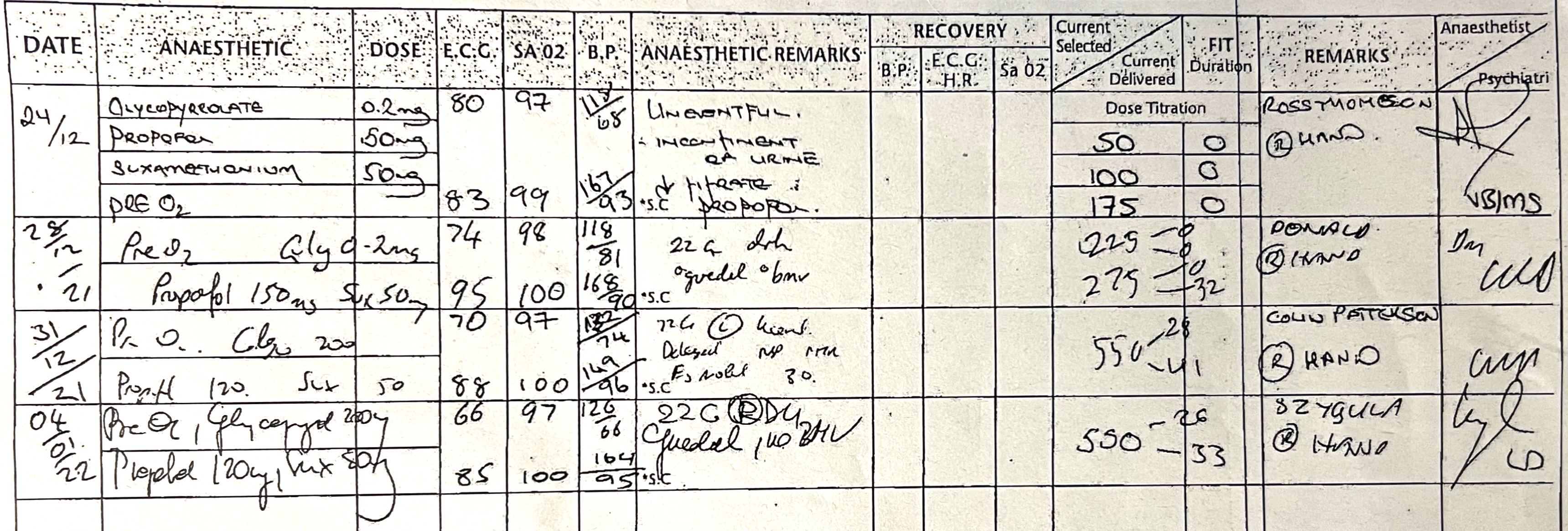
This is the record of my ECT 'treatments'. I will need further advice before I fully understand its meaning, but I see that I pissed myself during the first session. It seems that they gave me Propofol as an anaesthetic and tripled the dose after the first session, Suxamethonium Chloride as a muscle relaxant, and Glycopyrrolate to prevent bradycardia. They failed to make me have a seizure during the first session after three attempts with increasing amounts of current. They had two goes at increased doses during the second session and on the second attempt I had a fit of 32 seconds recoded on the ECG. They then doubled the current for the final two sessions and managed to make me have a seizure each time. They also gave me oxygen throughout the 'treatment' to increase my oxygen saturation.

This note is undated but it confirms that I was not just unhappy about being given ECT but that I was extremely distressed by the experience. This is the crude and ridiculous way in which they assessed the cognitive impairment caused by the electrocution and seizures. There was no long-term follow-up, no test for memory loss and certainly no imaging to identify any brain damage.
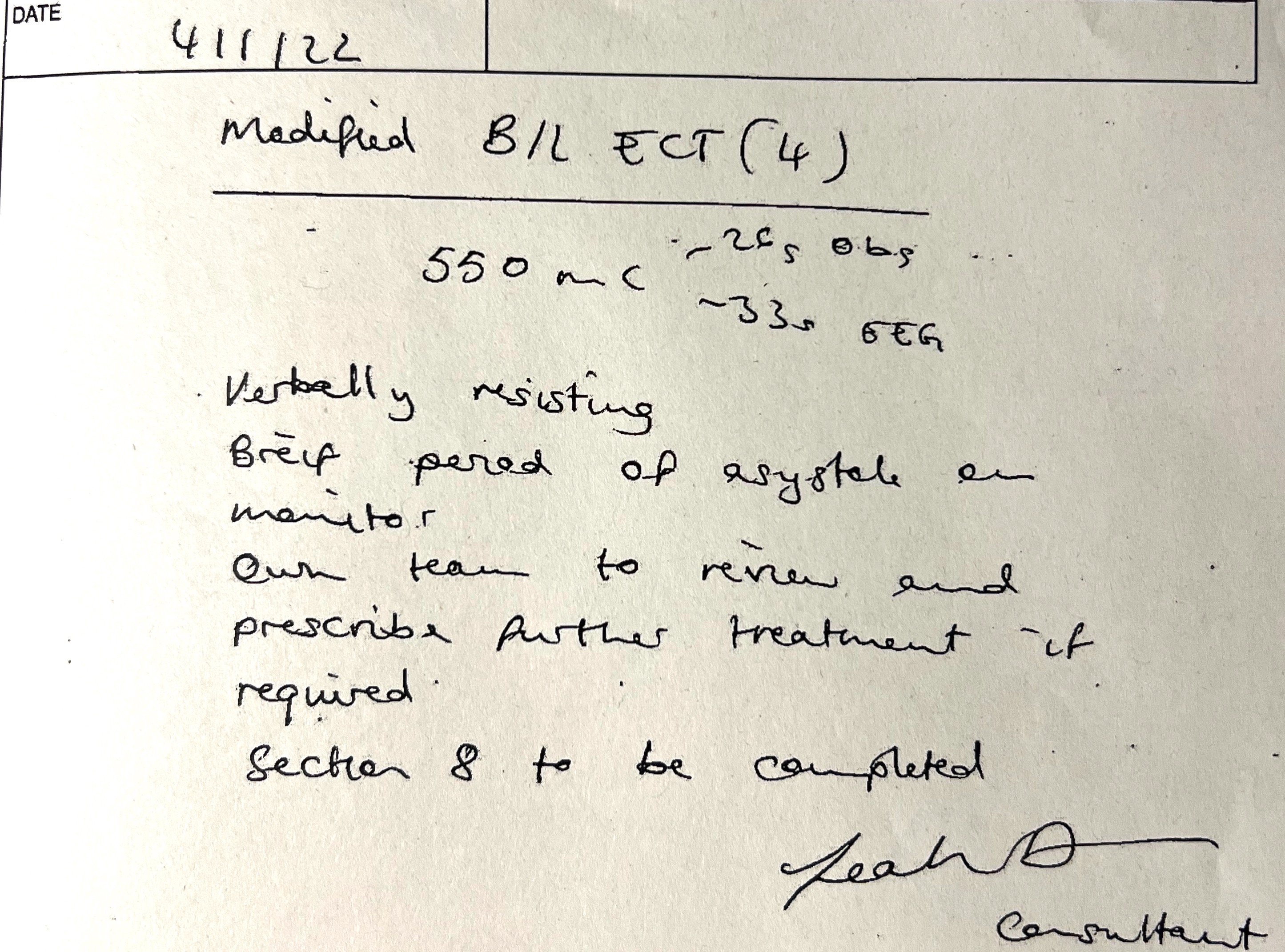
This is the note for the fourth ECT session, signed by the consultant Dr Leah Drever. It records that I was still verbally objecting to what was being done to me. It also records that I had a brief period of asystole. This is cardiac standstill or arrest. Given my age and the increased risk of cardiac complications caused by androgen deprivation therapy it is very concerning and I will try to get advice on its seriousness.
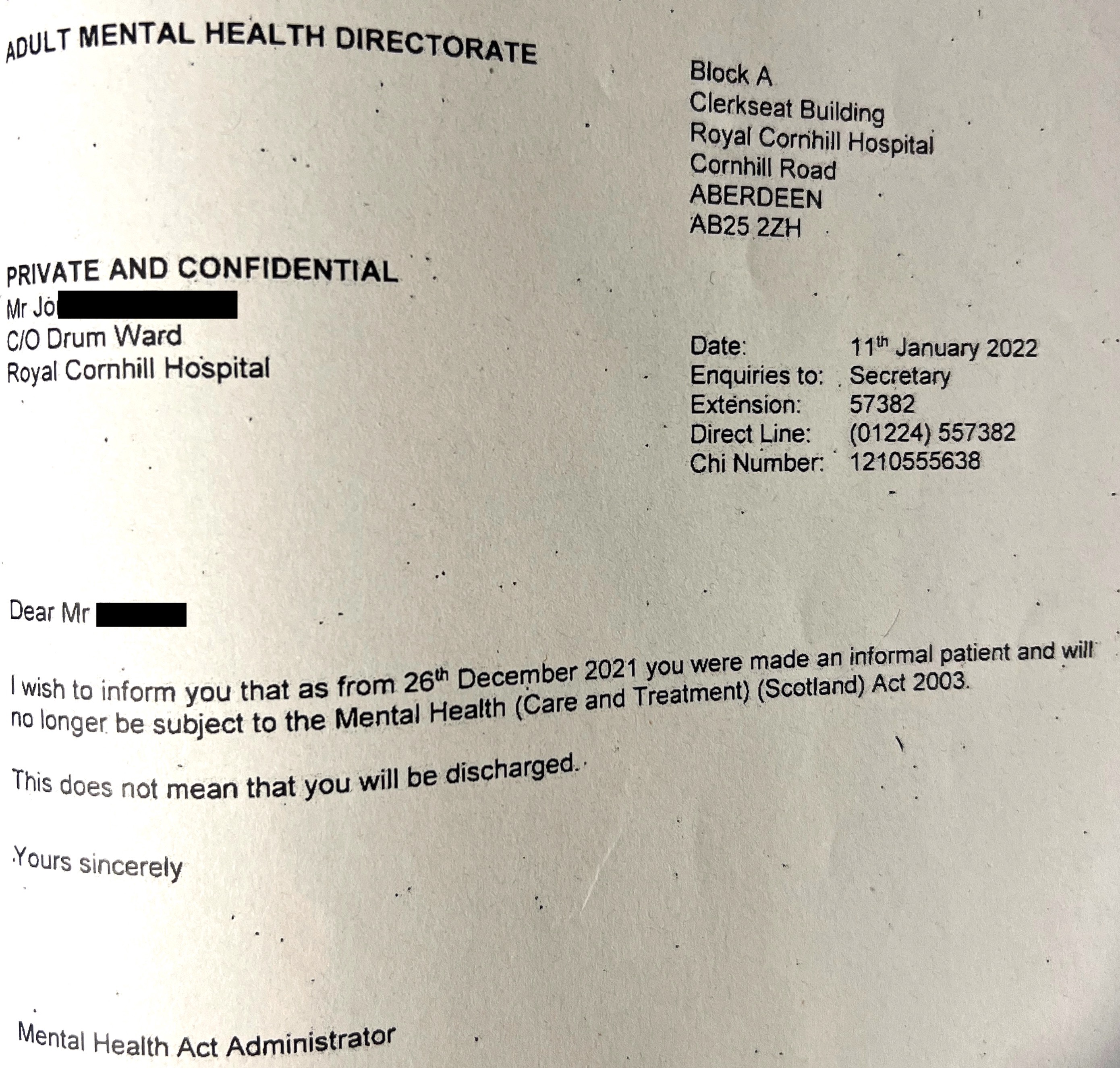
I received this letter informing me that I was an informal patient from 26th December 2021 onwards and so the hospital had no legal power to give me the ECT 'treatments' on 28th and 31st December 2021 and 4th January 2022 when I repeatedly told them that I did not consent. They did not tell me that I was an informal patient and had the right to refuse them, until after they had given the treatments.
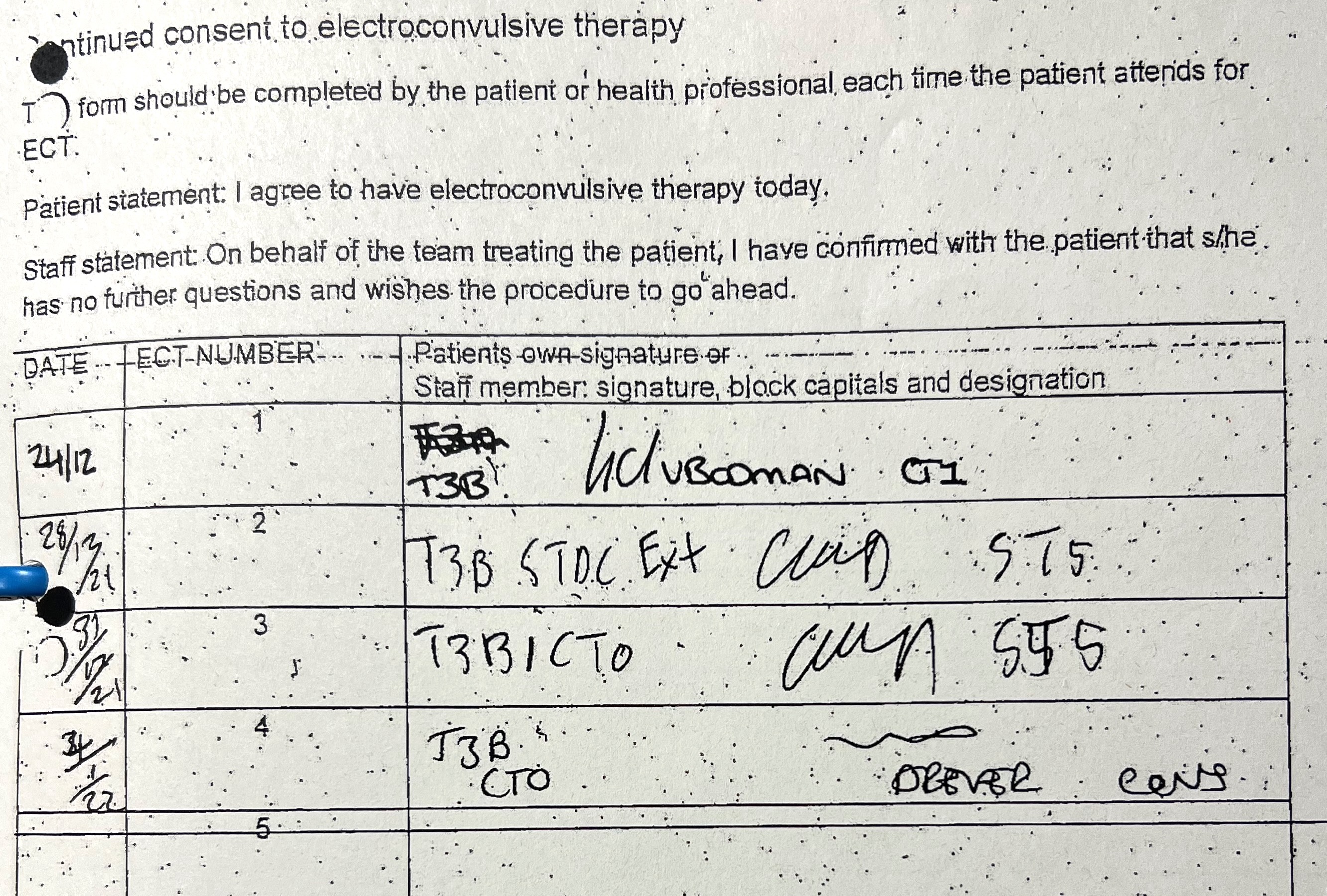
This is the record of my consent to ECT. The earlier consent form is undated and is simply crossed through with 'Awaiting T3 [the form to notify the Mental Welfare Commission] H. Badial' written. This form contains very serious errors. 'T3B' is probably being used as shorthand for a form used to notify the Mental Welfare Commission for Scotland when the patient is Detained and resisting or objecting. I was not Detained for sessions 2, 3 and 4. The note to 'treatment' Number 2 says 'STDC Ext', which means an extension to the Short Term Detention Certificate. The letter that I received on 11th January 2022 confirms that no such certificate had been issued and I was an informal patient at the time and so could and would have refused treatment if I had known that. 'Treatments' 3 and 4 say 'CTO', which means Compulsory Treatment Order. No such order had been granted at the time of the treatments and the Tribunal hearing on 6th January 2022 rejected an application for a CTO, so as an informal patient I could and would have refused these treatments as well had I been told about my rights. 'CT1', 'ST5' and 'Cons' refer to the grade of doctor signing the form. The signature against the 4th 'treatment' appears to be that of Dr Leah Drever. It seems that the hospital acted illegally by inflicting the 'treatment' on me against my strongly expressed wishes and by ignoring my distress, as well as by not telling me what they were going to do to me until the morning of the first 'treatment'.
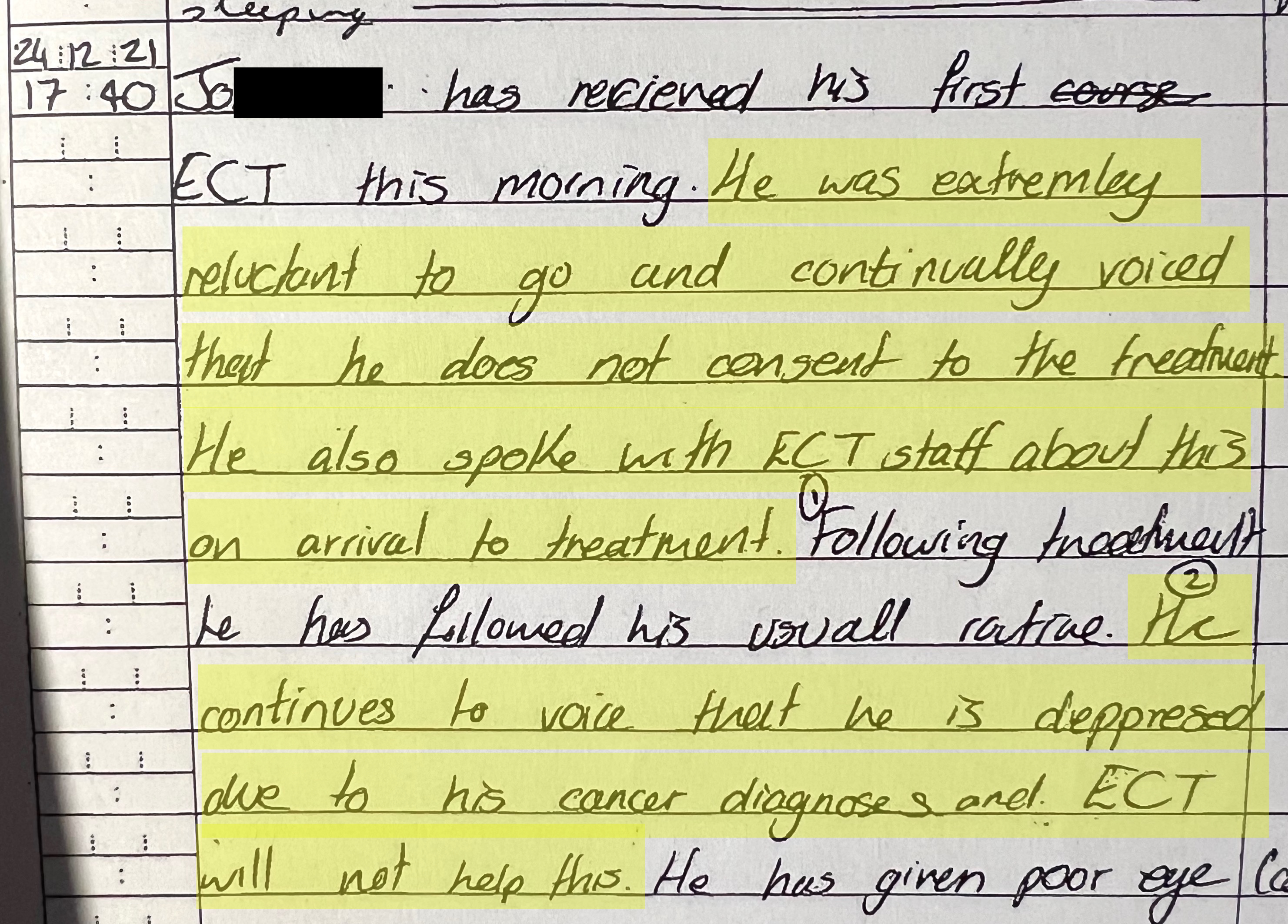
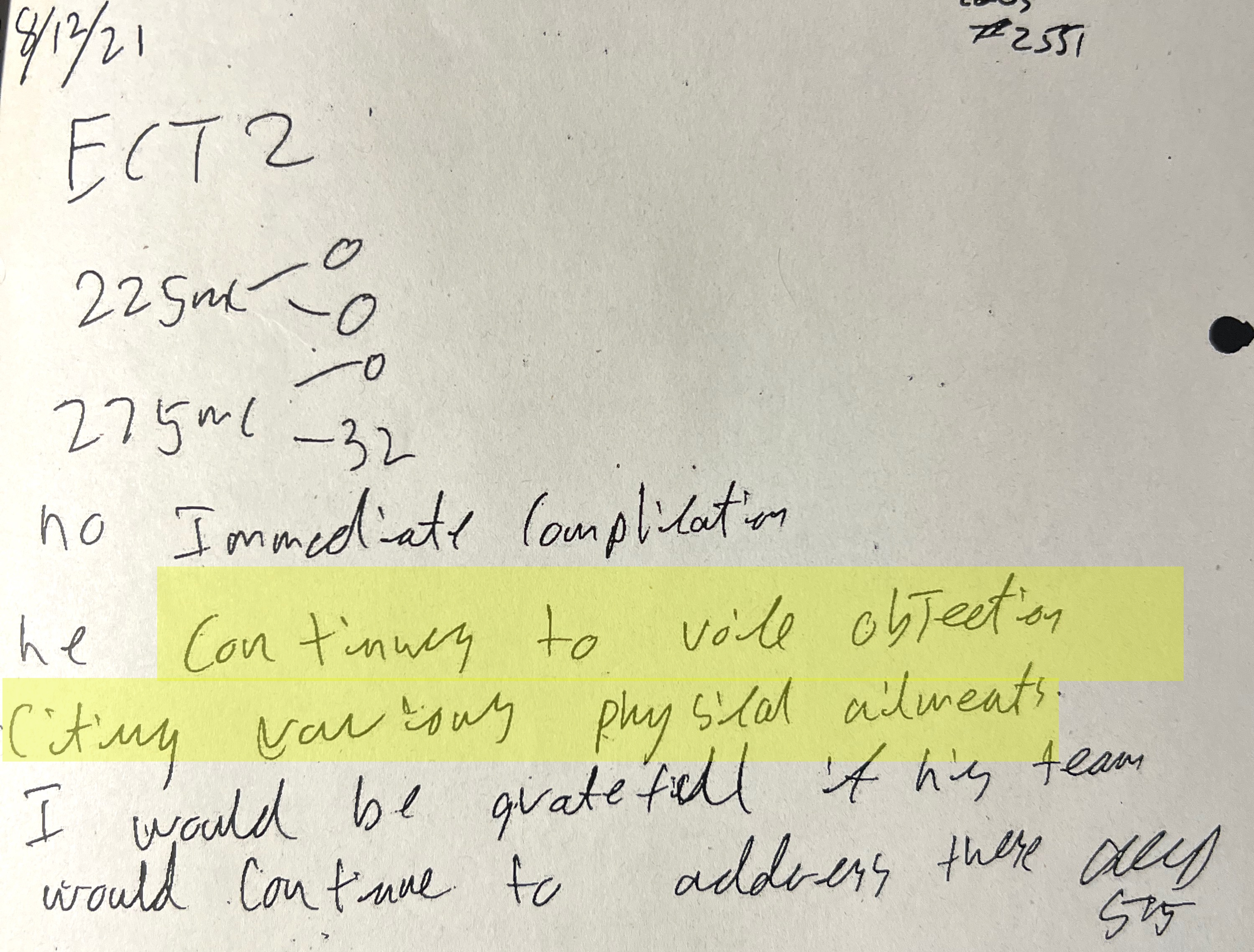
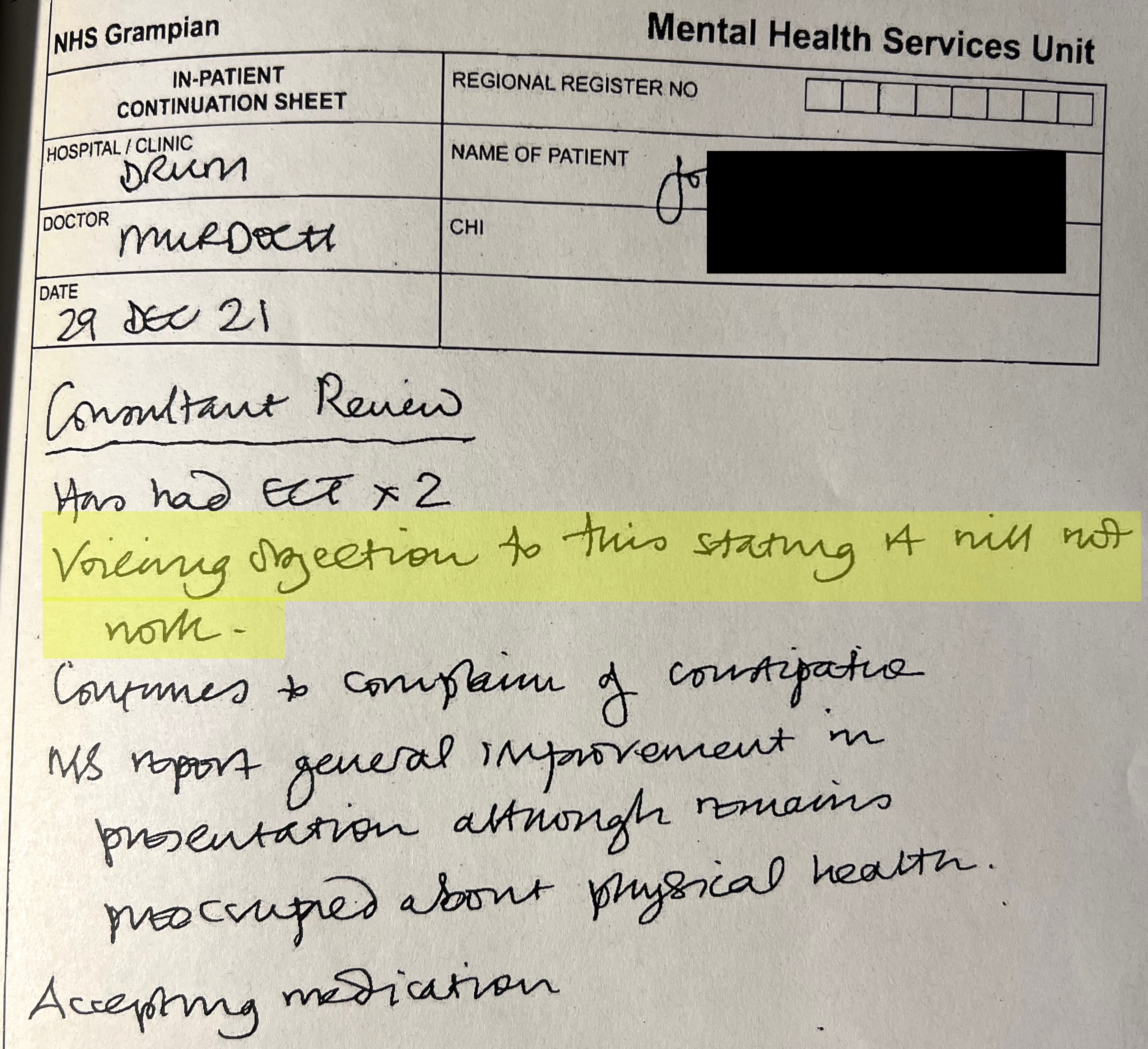
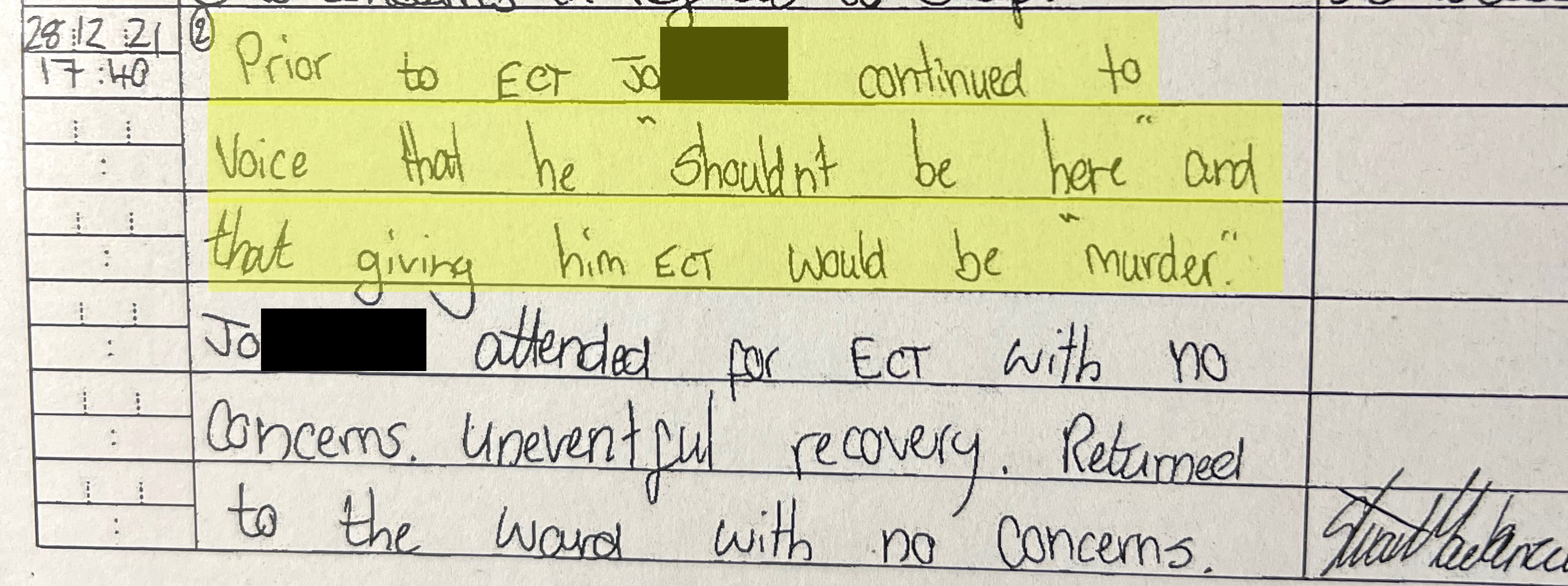
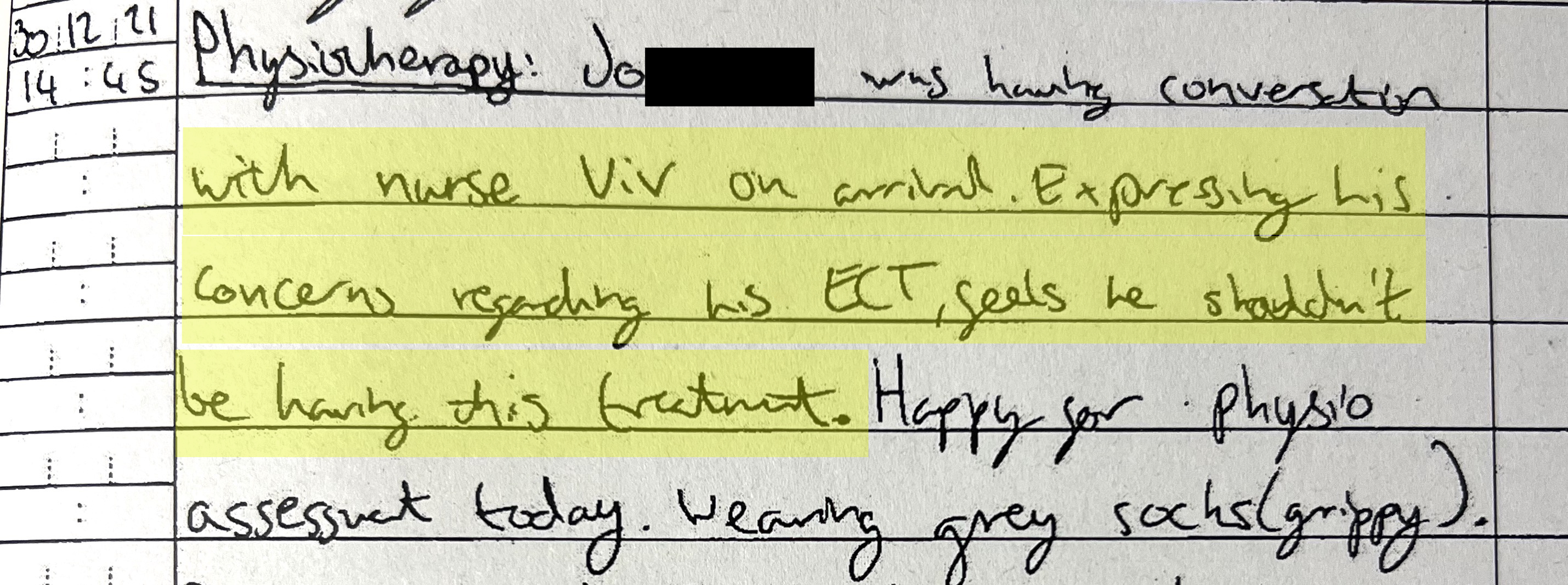
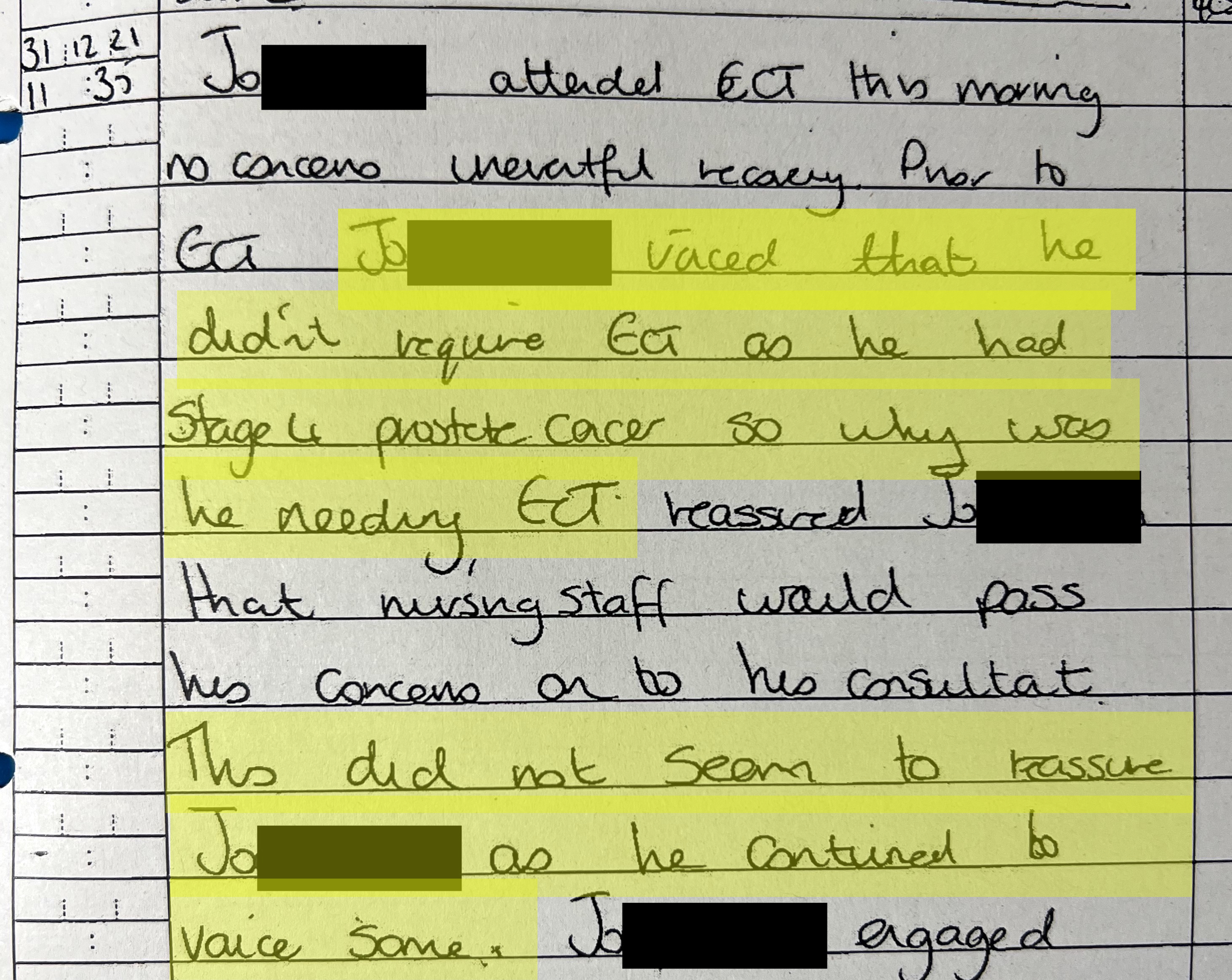
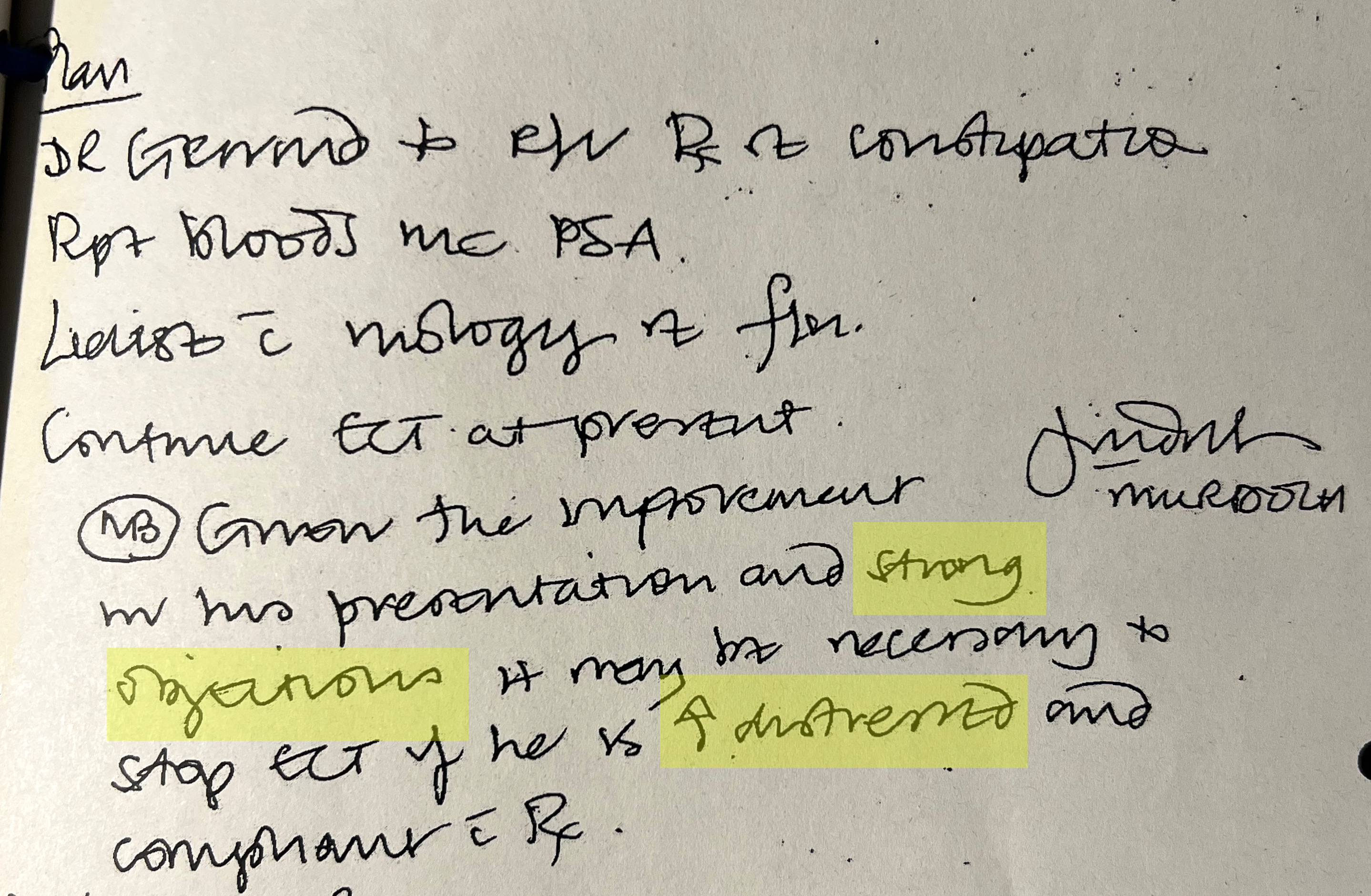
The extracts from my notes shown above prove that I continued to express my objection to forced electroconvulsive therapy but my objections were overruled. Dr Jane Murdoch used the term 'compliant', which shows that she did not treat me like a normal patient with a right to refuse treatment, as she should have done.
They wheeled me through these doors on the main corridor at the Royal Cornhill Hospital when they gave me forced ECT despite my distress and strong objections. The sign indicating that the doors lead to the ECT suite seems to be deliberately inconspicuous. Much more prominent is the name of Professor Ian Reid, who died in 2014 and, according to his obituary 'was passionate in his attempts to destigmatise ECT and to puncture the myths surrounding this controversial treatment, while highlighting that it is safe, effective and evidence based.' He was a charismatic figure who researched the biological markers for psychological distress, a search that others have concluded is largely futile. In 2012 he and his team published a paper that gained wide publicity, including on the BBC News, that claimed to have found evidence in support of the 'hyper-connectivity hypothesis' of depression by using MRI to scan the brains of nine severely depressed patients before and after ECT. They postulated that severely depressed people have increased functional connectivity in certain parts of the brain and that ECT reduced that connectivity and resulted in an improvement in depressive symptoms. Others now believe that this is scientific nonsense and that the 'reduced connectivity' that they saw on the MRI images was evidence of brain damage.
It was my misfortune to end up in a hospital where psychiatrists still have an evangelical belief in ECT as the ultimate cure for depression. They assaulted me by forcing a traumatic electrical brain injury on me without warning or consent when I had no history of depression before my cancer diagnosis less than three months earlier, when I had never been offered any psychological therapy, and when they had been giving me excessively powerful drug treatment for less than four weeks. I certainly didn't have 'treatment resistant depression'.